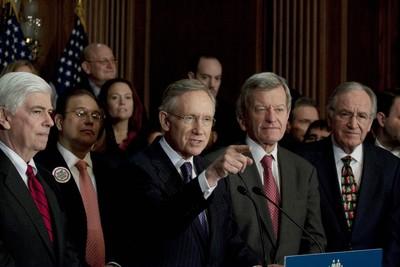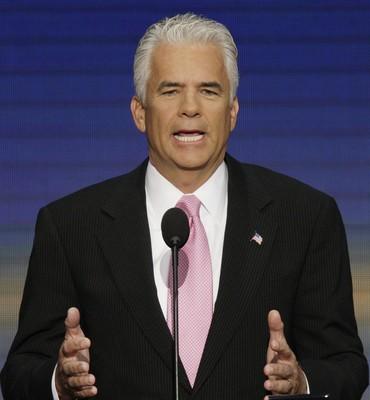Thursday vote set for health overhaul
WASHINGTON -- Sen. John Ensign said Tuesday the health care bill being debated in the Senate violates the Constitution by forcing people to buy health insurance or pay a penalty.
From the White House to Capitol Hill, however, Democrats on Tuesday predicted Senate passage of health care overhaul legislation after the bill cleared its second 60-vote test and the time was set for a final tally.
Meanwhile, South Carolina's attorney general said he and attorneys general from several other states are taking a look at whether special provisions in the Senate bill for Nebraska and other states are constitutional.
Ensign, R-Nev., raised a point of order against the bill on behalf of Republicans looking to delay its passage. It was the latest attempt by Republicans to stall the measure, but Senate Majority Leader Harry Reid of Nevada signaled Democrats have the votes to set it aside as they continue to move to final passage on Christmas Eve.
"We feel very sound in our position" that the bill is constitutional, Reid said.
Coming to the Senate floor in the middle of the afternoon, Reid, D-Nev. announced an agreement to vote on final passage at 5 a.m. PST Thursday, Christmas Eve. It would mark the 25th consecutive day of Senate debate on health care.
"The finish line is in sight," Finance Committee Chairman Max Baucus, D-Mont., said at a news conference with other Senate leaders and cheering supporters. "We're not the first to attempt such reforms, but we will be the first to succeed."
President Barack Obama said the Senate legislation accomplishes 95 percent of what he wanted on health care.
"Every single criteria for reform I put forward is in this bill," Obama said.
Sponsors say the Senate bill's mandate that virtuallly all Americans buy health insurance is authorized by clauses in the Constitution that give Congress powers to regulate commerce and impose taxes.
But Ensign and other opponents argue that the bill overreaches by forcing Americans to buy health insurance. They say that violates several provisions in the Constitution, including the Fifth Amendment that makes it illegal for the government to take personal property without just compensation.
"This bill would require Americans to buy a product that many of them do not want and simply cannot afford," Ensign said.
The comments by the Nevada senators reflect their split over health care. Reid has championed the reform bill, while Ensign has expressed deep skepticism on whether it will work as advertised.
A motion to shut off debate and move to a vote on a package of changes by Reid passed 60-39.
The final 60-vote hurdle, limiting debate on the bill itself, is expected to be cleared this afternoon, setting up the Thursday morning vote on the legislation, which at that point will need only a simple majority to pass.
Reid has refused to postpone action until after the holidays. On Tuesday, they started voting at sunrise. With fatigue and frustration rising, Reid appealed to his colleagues to set aside acrimony.
"I would hope everybody will keep in mind that this is a time when we reflect on peace and good things," he said.
Republican Leader Mitch McConnell of Kentucky said he, too, wanted to close the debate. After conferring with McConnell, Reid announced the timing of the final vote.
Even so, partisan fires were burning.
GOP Sen. Lindsey Graham of South Carolina denounced concessions won by conservative Nebraska Democratic Sen. Ben Nelson, whose support gave Democrats the 60th and final vote they need. Among other things, Nelson got an agreement that the federal government will pay to expand Medicaid services in Nebraska.
"That's not change you can believe in. That's sleazy," Graham said on NBC's "Today" show.
South Carolina Attorney General Henry McMaster, a candidate for governor, said he and his Republican counterparts in Alabama, Colorado, Michigan, North Dakota, Texas and Washington state are looking into special concessions made for Nebraska, Louisiana and other states.
"Whatever the legal status may be, and we hope to find out soon, these negotiations on their face appear to be a form of vote-buying paid for by taxpayers," McMaster said, adding he hopes people will challenge the legislation in court.
Reid has defended the deals, asserting that every senator got something they were looking for in the health bill.
Democratic Sen. Tom Harkin of Iowa also defended the concessions, saying: "The one that's being talked about for Nebraska, it also benefits other states. It's not just Nebraska."
Harkin said he would vote for the package even if it didn't contain concessions for Iowa. "The principle of this bill overrides everything," Harkin said on CBS' "Early Show."
Sen. Mary Landrieu, D-La., criticized after securing a boost in Medicaid for her state, defended the concessions she got, saying they benefited low-income families and small businesses.
Also Tuesday, Sen. Bill Nelson, D-Fla., announced that the inspector general of the Department of Health and Human Services has agreed to his request to investigate whether drug companies are raising prices of brand-name prescription drugs used by Medicaid and Medicare beneficiaries ahead of passage of the health care bill.
AARP says prescription drug prices are on the rise, but the Pharmaceutical Research and Manufacturers of America said in a statement that Nelson's request "was spurred, in large part, on misleading statistics and sensationalized media reports."
Weeks ago, a constitutional challenge to the bill was set aside in the Finance Committee after Democratic leaders ruled it was not germane. It has persisted as an issue among conservatives, and Ensign and other GOP senators said Tuesday they wanted a vote.
"Is it really constitutional for this body to tell all Americans that they must buy health insurance coverage? And if so, what's next? Will we consider legislation in the future requiring every American to buy a car?" Ensign said.
Under the bill, people would be required to purchase minimum health coverage by 2016 or pay a penalty of $750 or 2 percent of their income, whichever is more.
Sen. Orrin Hatch, R-Utah, said the bill puts the nation "in uncharted political and legal waters. "Congress has never crossed the line between regulating what people choose to do and ordering people to do it," he said.
Some have pointed to the requirement that people buy car insurance in order to drive.
Ensign argued that people who don't drive don't need to buy insurance, while the Senate's bill requires Americans to buy health insurance "whether or not they ever visit a doctor, get a prescription or have an operation."
Democrats praised Reid, who engineered compromises and maneuvered the legislation at the behest of Obama.
"With the passage of this bill, Harry Reid will have earned his place in the Senate's history," Harkin said. "To put it in biblical terms, he has the patience of Job, the wisdom of Solomon and the endurance of Samson. He has hung in there day after day and he is about to achieve what has eluded so many majority leaders going back half a century."
The Senate measure heading for passage Thursday still would have to be harmonized with a health care bill passed by the House in November before final legislation would go to Obama.
There are significant differences between the two bills, including stricter abortion language in the House bill, a new government-run insurance plan in the House bill missing from the Senate version, and a tax on high-value insurance plans embraced by the Senate but opposed by many House Democrats.


















